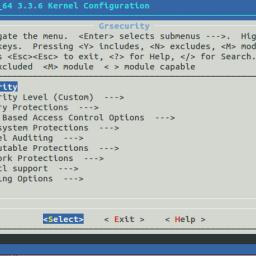Grsecurity stops issuing public patches, citing trademark abuse
 The gurus behind the popular and respected Linux kernel hardening effort Grsecurity will stop providing their stable patches to the public. In future, only paying sponsors will get access to stable patches to shore up their kernels' defenses. The test series, unfit for production use, will however continue to be available, to avoid impacting the Gentoo Hardened and Arch Linux communities. The project's full source code will still be released to the public at large, but non-sponsors will have to pick through every update to find out what's applicable to them.
The gurus behind the popular and respected Linux kernel hardening effort Grsecurity will stop providing their stable patches to the public. In future, only paying sponsors will get access to stable patches to shore up their kernels' defenses. The test series, unfit for production use, will however continue to be available, to avoid impacting the Gentoo Hardened and Arch Linux communities. The project's full source code will still be released to the public at large, but non-sponsors will have to pick through every update to find out what's applicable to them. The whole situation stems from WindRiver, a subsidiary of Intel, which "has been using the grsecurity name all over its marketing material and blog posts to describe their backported, unsupported, unmaintained version in a version of Linux with other code modifications that haven't been evaluated by us for security impact." After spending several thousand on legal fees, faced with "a huge legal team, the capability to drag out the case for years" and a threat to request "all available sanctions and attorneys' fees" were the lawsuit to proceed against them, Grsecurity decided pursuing the case through the courts was not practical.
Yes it does. Licenses are revokable at will. Property law 101, idiot.
The only thing that prevents license revocation is estoppel.
(Usually arising in a contract to license a work, potentially arising from an utterance by the grantor: such as a no-revocation clause in a license document (explicit disclaimer of the right to revoke gives rise to estoppel which you can argue in-front of a court to give the revocation no effect.))
Copyright is alienable by "any operation of law": property, contract, etc. There aren't "special forms" of alienation written into the statute (there didn't need to be).
Here's someone who disagrees with you, first hit on google for the lazy, if you need someone else to listen to (and obviously don't have a casebook nor a treatise handy, because you haven't bought any since you haven't attended a school where you would need them you piece of filth):
"""
>Default Rule When Silent on Revocability
>Most courts hold that simple, non-exclusive licenses with unspecified durations that are silent on revocability are revocable at will. This means that the licensor may terminate the license at any time, with or without cause. Conversely, courts typically hold that simple non-exclusive licenses that are silent on revocability but specify a set duration are non-terminable during the set duration. Results, however, may vary based on applicable state contract law and federal law preemption principles. We find that many people are unaware of these default rules. Because of the lack of absolute clarity on the default rules themselves and the impact other provisions in a license agreement may have on their application, we believe it is important not to remain silent on revocability in a license.
""" --Sidly Austin LLP
And here's some input from the 1976 US Copyright statute, copied from one of my casebooks in my library:
US 1976 Copyright Act. SS 304(c)(6)(A)
"A derivative work prepared under authority of the grant before its termination may continue to be utilizd under the trms of the grant after its termination, but this privledge does not extnd to th preparation after the termination of other derivative works based upon the copyrightd work covered by the terminated grant."
IE: Once the permission to modify linux is revoked, no further work on grsecurity may commence: it's over.
(The license of Linux (GPLv2) lacks a no-revocation clause, GPLv3 had to be drafted for a reason (adding one in) (so you could attempt to argue estoppel)) (Licenses are revokable at will barring estoppel)
Sorry SJW piece of shit. You didn't go through law school, you don't even know the edges of the law, and you are wrong. You can believe the FSF all you want; they have an interest in hiding the truth. I'd be happy for your whole edifice to crumble as that would hurt you pro-women's rights, anti-marry-young-girls pieces of filth.